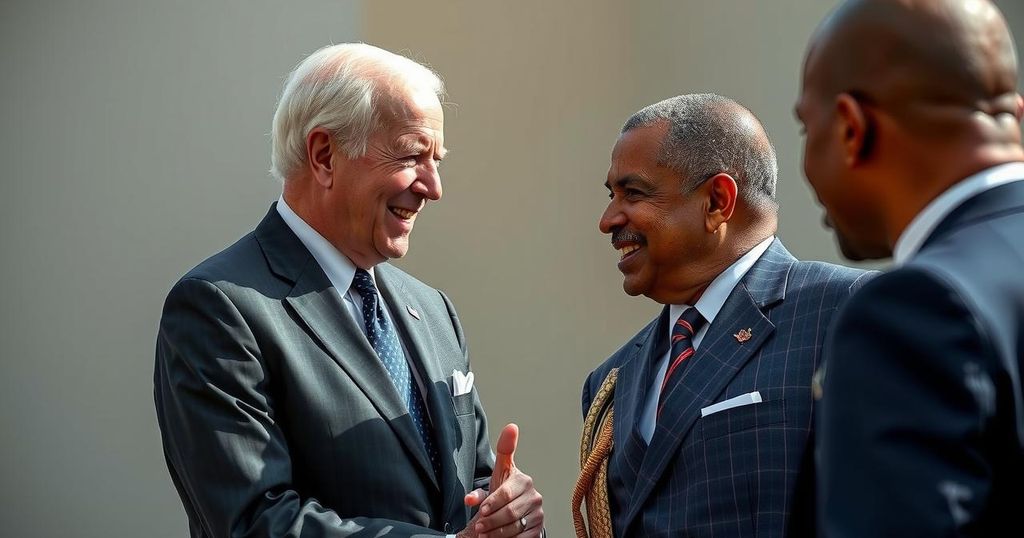Joe Biden’s Africa trip focuses on the Lobito Atlantic Railway project, a U.S.-backed initiative designed to facilitate mineral exports from Congo to Angola, countering China’s influence. This visit highlights a shift in U.S. relations with Angola and underscores the importance of securing access to critical minerals for national security amidst growing geopolitical competition.
President Joe Biden is set to undertake a significant visit to Angola, commencing Sunday, aimed at reinforcing U.S. commitments to Africa while emphasizing a strategic railway initiative designed to mitigate China’s influence in the region. The Lobito Atlantic Railway, financed with a U.S. loan, will serve to connect the resource-abundant Democratic Republic of Congo (DRC) and Zambia to Angola’s Lobito port, streamlining the export of vital minerals such as copper and cobalt, essential for battery production and electronics.
The United States’ concern regarding China’s dominance in the DRC underscores this initiative, particularly following China’s recent agreement with Tanzania and Zambia to revitalize a competitive railway on Africa’s eastern coast. Although Biden’s trip coincides with the latter part of his presidency, it is anticipated that former President Donald Trump will champion the railway project upon his return to office in January, as indicated by former Trump administration officials.
Tibor Nagy, a retired ambassador, noted Trump’s anticipated dual priorities concerning Africa: countering Chinese and Russian advances while securing access to critical resources. This sentiment highlights the importance of the Lobito Atlantic Railway (LAR) project in facilitating U.S. economic interests. The initiative is being supported by industry leaders, including global commodities trader Trafigura and Portuguese construction group Mota-Engil, with the U.S. Development Finance Corporation providing a substantial $550 million loan for the project’s refurbishment.
Biden’s itinerary includes a brief stop in Cape Verde for consultations with local leadership before proceeding to Angola, where he is expected to visit a slavery museum in Luanda and the Lobito port over the course of his two-day trip. This journey marks a fulfillment of Biden’s pledge to enhance U.S.-Africa relations, although some commitments remain unaddressed, such as advocating for African representation on the U.N. Security Council.
Simultaneously, the Biden administration faces challenges in furthering access to African minerals vital for national security, especially following recent geopolitical setbacks such as losing a major military base in Niger. Despite Angola’s longstanding ties with China and Russia, recent engagement with the West indicates a potential shift in partnerships to bolster economic advancement.
Ricardo Viegas d’Abreu, Angola’s transport minister, remarked on China’s growing prominence in Africa, attributing it to the relative neglect from Western nations. The historical context of U.S.-Angolan relations further enriches the current dialogue, as the U.S. hopes to reconcile a troubled past marked by Cold War allegiances during Angola’s civil conflict.
U.S. officials assert that the Lobito rail project exemplifies a broader strategic undertaking, intended to establish viable public-private partnerships leading to future infrastructural ventures across Africa. However, skepticism persists regarding the project’s viability and completion timeline, particularly concerning its potential second phase that, if realized, could connect to ports on the eastern coast of Africa, thereby providing competition to China.
The Congolese government is keen on diversifying its mining partnerships, as articulated by Judd Devermont, a former top Africa adviser under Biden, who emphasized the necessity of multiple avenues for transporting critical minerals across the continent to reduce dependence on China. This highlights the shared benefit of maintaining diversified access routes for resource exportation, fostering broader economic networks across Africa.
The article discusses President Joe Biden’s upcoming trip to Angola, emphasizing the significance of the Lobito Atlantic Railway project, which aims to create a U.S.-backed transport route from Congo to the Angolan coast. This railway is viewed as a strategic measure to counter China’s growing influence in the resource-rich DRC, particularly in the mining sector which is critical for U.S. interests in metals essential for technology and energy.
President Biden’s trip to Angola reflects a strategic pivot in U.S. foreign policy towards Africa, particularly in light of rising competition with China for critical resources. The Lobito Atlantic Railway project symbolizes a commitment to enhancing trade and infrastructure in the region while addressing historical disparities in U.S.-Africa relations. Moving forward, the administration faces substantial challenges in implementing its ambitious agenda and ensuring that African nations can enjoy equitable partnerships conducive to development and security.
Original Source: www.usnews.com






